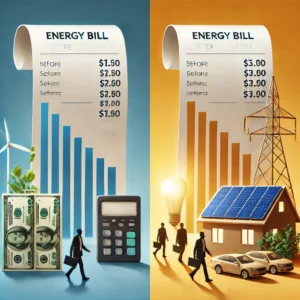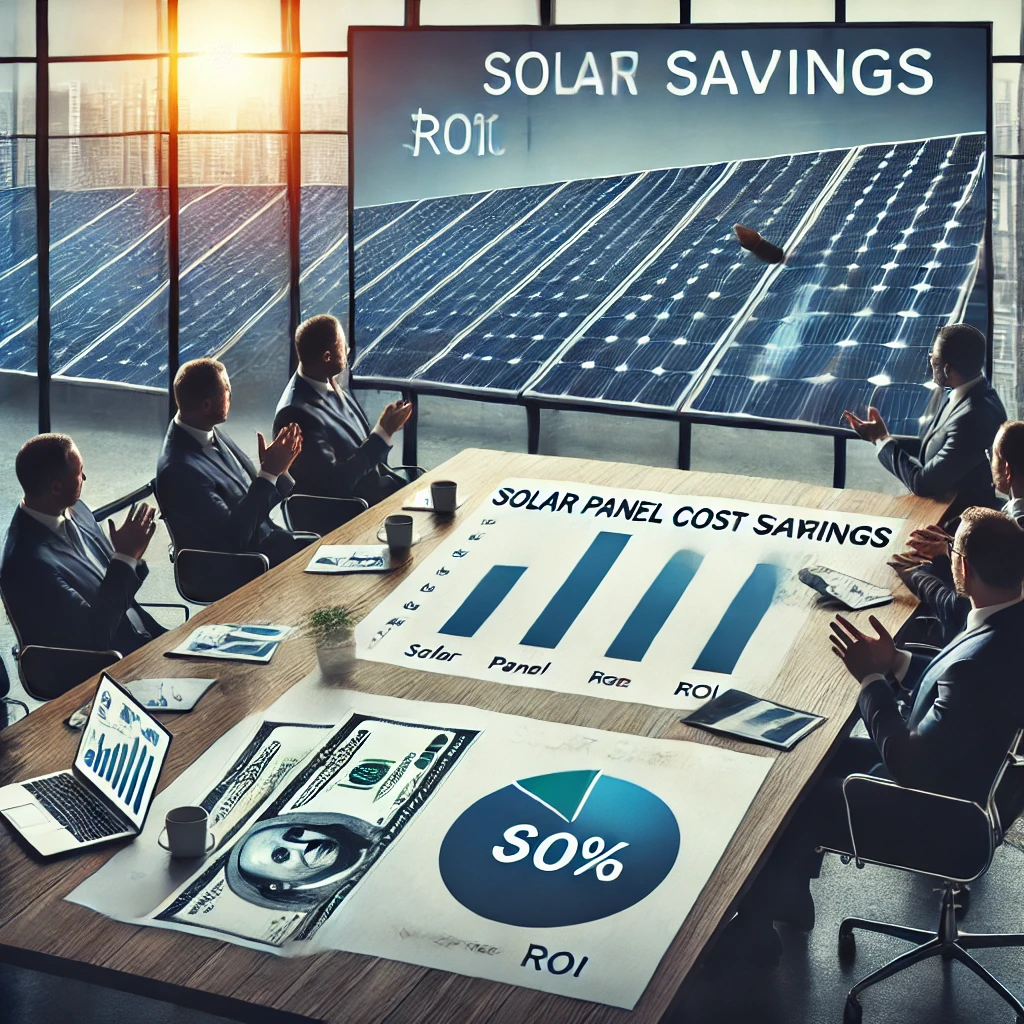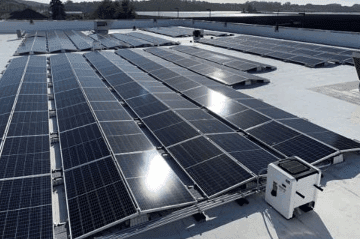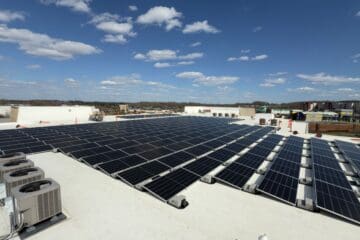 As energy prices rise and environmental concerns grow, more businesses are transitioning to sustainable energy solutions to cut costs and reduce their carbon footprint. Installing commercial solar panels is one of the most effective ways to achieve these goals. By generating electricity from renewable sources, businesses can significantly lower their energy bills and gain long-term financial stability. This comprehensive guide combines the key points from both articles to provide you with an in-depth understanding of the benefits, costs, and installation process of commercial solar panels. Additionally, we’ll explore the financial incentives that can make solar power more accessible to businesses of all sizes.
As energy prices rise and environmental concerns grow, more businesses are transitioning to sustainable energy solutions to cut costs and reduce their carbon footprint. Installing commercial solar panels is one of the most effective ways to achieve these goals. By generating electricity from renewable sources, businesses can significantly lower their energy bills and gain long-term financial stability. This comprehensive guide combines the key points from both articles to provide you with an in-depth understanding of the benefits, costs, and installation process of commercial solar panels. Additionally, we’ll explore the financial incentives that can make solar power more accessible to businesses of all sizes.
At Aurora Energy, we specialize in helping businesses navigate the shift to solar power, offering tailored solutions that meet the unique needs of commercial properties. Whether you’re looking to improve efficiency, reduce operating costs, or enhance your company’s sustainability profile, this guide has all the information you need to make an informed decision about investing in solar energy.
Why Solar Panels for Commercial Buildings Are a Smart Investment
What Makes Commercial Solar Panels the Right Choice for Your Business?
Switching to solar energy offers a host of benefits beyond simple cost savings. Let’s take a closer look at why installing solar panels for commercial buildings can lead to more efficient operations and substantial long-term financial returns:
- Reduced Operating Costs: Solar power allows businesses to generate their own electricity, cutting or even eliminating the need to purchase power from the grid. With energy prices becoming more volatile, solar panels offer predictable energy costs, helping businesses stabilize their budgets.
- Energy Independence: With a solar power system in place, businesses can become more resilient to fluctuations in electricity prices. This energy independence provides a safeguard against rising utility rates, ensuring that the costs of running your business remain steady over time.
- Sustainability and Corporate Responsibility: In today’s business landscape, being eco-friendly is not just an option—it’s an expectation. Solar power allows businesses to reduce their carbon footprint, attract environmentally-conscious customers, and position themselves as leaders in corporate responsibility.

Understanding Commercial Solar Panel Costs: What to Expect
What Factors Influence the Cost of Installing Commercial Solar Panels?
When considering solar energy for your business, the upfront costs may seem intimidating. However, the long-term financial benefits often outweigh the initial investment. Let’s break down the key factors that affect the cost of a commercial solar panel installation:
1. Solar System Size and Energy Needs
The size of your solar power system is one of the biggest drivers of cost. Larger systems with more panels naturally come with higher upfront costs but often deliver greater savings in the long run. To determine the right system size, solar providers will assess your building’s energy consumption and recommend a solution that meets your electricity needs.
- Smaller Office Buildings: These may require a 50-kilowatt (kW) system, depending on energy usage.
- Large Industrial Facilities: Larger commercial properties may need several hundred kilowatts (kW) or even megawatts (MW) of solar capacity.
By tailoring the system size to your business’s energy requirements, you can optimize both the solar installation cost and long-term savings.
2. Solar Equipment and Technology
The quality and type of solar equipment you choose can significantly influence the cost. High-efficiency panels may cost more upfront but can generate more energy with fewer panels, reducing the overall space needed for installation. In addition to the panels themselves, the cost of inverters, mounting hardware, and wiring must also be considered.
Pro Tip: While high-efficiency solar panels come with a higher price tag, they can generate more electricity per square foot, meaning you may need fewer panels overall.
3. Labor and Solar Installation Complexity
Labor costs will vary based on the complexity of the installation. For example, installing solar panels on a flat roof may be less expensive than installing them on a sloped or irregularly shaped roof that requires special mounting systems. Businesses located in areas with higher labor costs may see higher installation prices.
At Aurora Energy, we emphasize the importance of professional solar installation. A well-executed installation ensures that your system will function optimally and deliver maximum savings.
4. Location and Available Solar Incentives
Your geographic location plays a significant role in both the installation cost and the system’s overall effectiveness. Areas that receive more sunlight may require fewer panels to generate the same amount of electricity as a system in a less sunny region. Additionally, businesses located in areas with generous solar incentives can drastically reduce the net cost of their systems.
The Investment Tax Credit (ITC) is a federal program that allows businesses to deduct a portion of their solar installation costs from their federal taxes. Depending on your location, state and local governments may offer additional tax breaks, rebates, or performance-based incentives.
Key Benefits of Commercial Solar Power Systems
How Solar Energy Boosts Business Efficiency and Cost Savings
The decision to install solar panels for commercial buildings comes with multiple benefits beyond cost reduction. Let’s explore the core advantages that make solar power a valuable investment for businesses:
1. Long-Term Solar Energy Savings
One of the primary reasons businesses invest in solar panels is the potential for significant long-term savings. With solar energy, companies can reduce or eliminate their reliance on the grid, leading to lower monthly utility bills. Over time, these savings can more than offset the initial installation costs, making solar power a smart financial investment.
- Stabilize Energy Costs: Traditional energy prices fluctuate due to fuel costs, supply disruptions, and geopolitical events. Solar energy allows businesses to lock in stable electricity costs, which can make long-term budgeting much easier.
- Net Metering Opportunities: Many states offer net metering, where businesses can sell excess electricity generated by their solar panels back to the grid. This provides an additional revenue stream and further reduces energy costs.
2. Enhanced Solar Energy Efficiency
Solar power is not just about generating electricity—it’s about using it efficiently. Businesses can pair their solar systems with energy storage solutions, like batteries, to store excess power for use during peak demand periods or at night. This ensures that every kilowatt-hour generated is utilized effectively, reducing waste and cutting costs.
Additionally, energy storage offers protection against power outages, ensuring that your business operations continue even when the grid goes down.
3. Increased Property Value
Commercial properties equipped with solar installations are seen as more valuable assets. Solar panels lower operating costs for potential buyers or tenants, making the property more attractive in a competitive real estate market. Installing a commercial solar power system not only saves on energy costs but also boosts the long-term value of your property.
4. Sustainability and Brand Reputation
As consumers and investors become more environmentally conscious, businesses that adopt renewable energy gain a competitive advantage. Solar power allows your company to demonstrate its commitment to sustainability and corporate social responsibility, attracting Eco-conscious clients and partners.
In some industries, particularly those with high energy consumption, embracing solar power can be a key differentiator, helping businesses stand out as leaders in sustainability.
The Commercial Solar Installation Process
What Does the Solar Panel Installation Process Involve?
The installation process for commercial solar panels is straightforward but involves several key steps. Here’s what businesses can expect during the transition to solar power:
1. Site Assessment and Feasibility Study
A professional solar provider, such as Aurora Energy, will first evaluate your site to determine its suitability for solar panels. This includes assessing factors like roof space, structural integrity, and the amount of sunlight the building receives.
2. Solar Custom Design and Engineering
Once the feasibility study is complete, engineers will design a custom solar system tailored to your building’s specific energy needs. This design ensures that the system generates the optimal amount of electricity while fitting within the available roof space.
3. Permitting and Approvals
Local authorities typically require permits for solar installations. The solar provider will handle all the necessary paperwork to ensure the installation complies with building codes and regulations.
4. Solar Installation and Commissioning
The solar panels are then installed and connected to your building’s electrical system. Once the installation is complete, the system will be tested and commissioned to ensure it functions properly. Monitoring systems will also be set up to track energy production and efficiency.
5. Ongoing Solar Maintenance
Solar panels require minimal maintenance, but regular inspections and occasional cleaning are recommended to ensure optimal performance. Many solar providers offer warranties that cover equipment and installation, providing peace of mind for years to come.
Maximizing Your Solar Investment
How Can Businesses Maximize Savings from Commercial Solar Power?
While the upfront costs of commercial solar panels may seem significant, there are several strategies businesses can use to maximize their return on investment:
- Leverage Available Incentives: Take advantage of federal, state, and local programs that provide rebates, tax credits, or other financial incentives for solar installations. These programs can significantly reduce the net cost of your system.
- Invest in Energy Storage: Pairing your solar panels with a battery storage system allows you to store excess energy and use it during peak demand periods, reducing reliance on the grid and lowering energy expenses.
- Explore Financing Options: Many solar providers offer flexible financing options that spread the cost of installation over several years, making solar power more accessible for businesses of all sizes.
Conclusion: Invest in a Brighter Future with Commercial Solar Power
Commercial solar power systems offer a sustainable, cost-effective solution for businesses looking to reduce operating costs, improve efficiency, and enhance their environmental credentials. By generating electricity from renewable sources, companies can take control of their energy future, stabilize costs, and position themselves as leaders in the green economy.
At Aurora Energy, we are committed to helping businesses navigate the transition to solar power with customized solutions that meet their unique needs. Whether you’re looking to lower energy bills, increase sustainability, or boost property value, our team of experts is here to guide you every step of the way.
Invest in solar power today and build a brighter, more sustainable future for your business.



